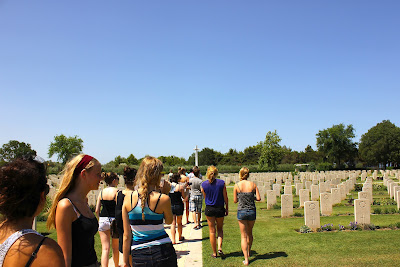On Monday, after classes had ended, we travelled to the coast to visit a traditional trabocco.
 |
| Trabocco Punta Tufano |
Trabocchi date back to the 1700s. They're complex structures made of pine logs, designed to allow fishermen to catch fish even in rough seas.
 |
| Trabocco Punta Tufano |
A large net is suspended from the antennae of the trabocco. The fishermen would lower the antennae to drop the empty net into the water. When the timing was right, they would then raise it filled with their catch.
These days, the trabocchi are no longer used for fishing, but have been restored because of their historical importance. Some have been converted into restaurants.
When we got to the trabocco, the owner spoke to us about the history of the coast and these amazing fishing machines.
Two of the students translated for us.
Afterward we were served fresh bread, lemon infused olive oil, and orange marmalade on waffles.
The great weather and scenery soon turned the afternoon into a photo shoot!























